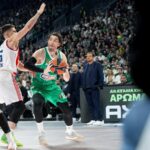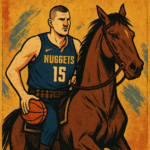The history books will forever record Panathinaikos as having won game three of the 2012-13 Greek League championship series over Olympiacos by a score of 76-72 to complete a three-game sweep. The reality, as is sadly so often the case in Greens-Reds match, was more complicated.
With just under a minute and a half remaining, an Olympiacos turnover gave Panathinaikos the ball. At this point, Reds fans unleashed their fury on the Greens’ bench for a scene well-known to those familiar with Greek basketball.
Game three therefore ended with refs calling the match with 87 seconds remaining; a request from the officials to clear the building went unheeded.
While some Olympiacos players admitted in defeat that “We did not play good basketball” (18-of-79 three-point shooting in the three games is one statistic fortifying that opinion) or that perhaps they’d been mentally/physically/emotionally exhausted by the Euroleague Final Four victories, but one cannot deny the assessment that “anything can happen in 87 seconds,” particularly when the side down by four points have proven to be Europe’s comeback kids these past two seasons.
The Red Planet report portrays a team “disrespected” by Greek League referees and, by extension, by league officials. Again, hard to deny, considering reports that Reds players were subject to the Wada Test some 15 times since last year’s playoffs – and with not a single positive result.
Said Kostas Papanikolaou in the post-game presser, as reported by Eurohoops: “…we are deeply hurt by the rumors […] that doping had to do with our Euroleague win. This is something that we didn’t deserve and it affected us.” Olympiacos coach Georgios Bartzokas bitterly stated that “A journalist, who is a joke, started a rumor and the Greek state changes its anti-doping policy. That says a lot about Greece. Nobody around Europe mentioned anything like that about us…”
Backtracking on those doping allegations, the problem – well, *a* problem – is that this nasty, destructive, ultimately distracting little “rumor” could well be considered “slander” in some quarters. Apparently originally begun as a cheap-shot attention grabber on a Greece-based website alleging Olympiacos players to have been doped up for the Euroleague Final Four, Panathinaikos owner Dimitris Giannakopoulos then reported gravely to Greece Prime Minister Antonis Samaras. Thus came the Order From On High and regular post-game WADA tests for Olympiacos.

Despite getting his way on this matter, however, Giannakopoulos was apparently still not satisfied. In game two of the Greek League championship series at Panathinaikos’ arena, the team’s owner “attacked” a referee (though Giannakopoulos’ main weapon may have been language – albeit quite harsh language) at halftime. As though the officials needed more pressure in front of a rabid Greens crowd, Giannakopoulos told them that they “will not be leaving here.” Halftime began five minutes late, and PAO took game two, 63-52. The owner’s actions were recorded by the referee corps in the official game report to the league and are presumably pending review.
Meanwhile, video proof of allegations of the zebras reffing scared in the second half of game two have become, let us say, a bit scarce on YouTube and other video-sharing websites…
Going back a bit further, the 2013 Greek Cup final in February was also interrupted by fans, producing yet another “Final of Shame” in that country. Held on a neutral homecourt, both sides of fans within the reduced crowd of 1,800 behaved badly to say the least: Olympiacos’ Kyle Hines reportedly fainted after being hit by a flare which burned some of the hair on his head; and after Mike Bramos was struck by an object thrown from the stands in the 13th minute, the referees stopped the match. Rioting ensued, the gym was evacuated and the game was finished in front of empty stands.
Olympiacos players refused to collect their silver medals afterward, and Giannakopoulos’ response was to engage in more verbal battle with Reds’ fans, crying for punishment and labeling Olympiacos a “club of filth.”
So what, if anything, can/should Euroleague officials do about Giannakopoulos, Panathinaikos and yes, even Olympiacos? Here is a very visible face and very recognizable brands in a sports association extremely concerned about its PR value and international publicity. Left unchecked, Giannakopoulos may yet decide to continue his war against all things Olympiacos (and zebra-striped) in the big league – and who knows what these teams’ fans are capable of in a head-to-head meeting?
Euroleague boss Jordi Bertomeu took Giannakopoulos to task (somewhat) in April, with an official letter stating that several incidents involving Giannakopoulos and/or Panathinaikos “have cast a negative light on our sport.”
But recall back how Giannakopoulos’ whinging about the refereeing of the Greens’ game one semifinal against Barcelona got him slapped with a €150,000 fine. This was likely easily shrugged off by Giannakopoulos, and BiE finds it a bit hard to believe a simple monetary solution is the answer; Euroleague brass seem to realize this. For behavior exhibited by the fans in games one and two of the semifinal series against FC Barcelona, the club would have to pony up €100,000 and play two months’ worth of EL home games before an empty stadium.
And what would be enough? In light of the Greek Cup disaster, Giannakopoulos received a two-month ban from participation of any sort with his team. He then steadfastly ignored the dictum, quoted as saying “Once more the Red system has struck. This is a mockery of a decision. I will not comply. If they dare, they can try to keep me out of OAKA…”
Despairing stuff, indeed. Back at that game three press conference, Papanikolaou and Bartzokas contributed the most salient points. Said the player: As Euroleague champions, “We should be leading European basketball by example. Instead we self-destroy everything good our teams achieve.” Said the coach: “in the end, we hurt Greek basketball ourselves with such nonsense.”
Nonsense it is indeed, with such paltry incidents unseemly of a great sports culture. One commenter at BallinEurope stated that “the Greek League has turned into a mafia league” – and that is getting harder and harder to deny.





Leave a Reply